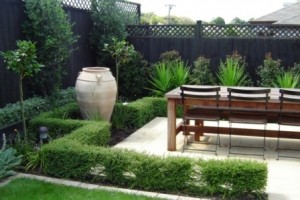Talking garden design with Caroline Wesseling
Garden designer Caroline Wesseling shares her thoughts on planting, colour and what makes a great garden.

Caroline Wesseling
“As a designer it is important to design gardens that reflect the client’s personality and needs with added “style and flair” says Caroline.
“You need to be able to quickly visualise what’s right for the site and see the end result in relation to the needs and desires (or “brief”) the client conveys. You should then confidently translate the stages necessary to get to that end result. A designer needs get to know the clients so they can relate their needs and dreams for their property. It is important that clients get a garden they feel comfortable in and have a strong emotional response to it.
“When working on a garden design I always try to respond to the architecture of the house and the nature of the site, as well as the client’s personality which is mirrored in the interior of the house. Each garden is then “tailor-made” for the client and the site.”
A consistent theme of Caroline’s work is the emphasis on strong structure, using both hard and soft landscaping materials. Plants are used to manipulate spaces and create strong forms. Some designers view plants as decoration, as a softening element for the architecture. But strong architecture and strong landscaping can work together.
 “Plants don’t just add decoration but can be used for sculptural and structural purposes giving that extra “wow factor”. Many plants are not naturally sculptural but can be planted in masses or clipped to give structure to a garden.
“Plants don’t just add decoration but can be used for sculptural and structural purposes giving that extra “wow factor”. Many plants are not naturally sculptural but can be planted in masses or clipped to give structure to a garden.
“In garden design it is important to remember that “green is a colour”. Contrasting variations of greens and the textures in plants give added interest to the garden. Alternatively use plants with linear upright foliage against rounded shapes, or planting layers of contrasting colour and texture,” she says.
Clipped hedging is a passion of hers, but Caroline is careful not to use it if it does not fit the theme she is achieving for the garden. With the correct choice of plants flowers and colour can also be achieved on a seasonal basis.
Themes are important and help develop the style of layout and the selection of plants for the garden. A chief aim is to create gardens that look good all year round with low maintenance. To achieve this use plants not only suitable for the style but also for the conditions of the site. Plants with good form and disease resistance lead to a low maintenance garden.
Much of Caroline’s work is influenced by the modern contemporary gardens of Europe and a recent trip to the Netherlands where designers use blocks of plants both bold and soft to good effect in very small spaces. At other times she uses ideas consciously and unconsciously absorbed through her study and hands on experience with her garden maintenance properties.
 “Gardens are always evolving. It doesn’t end with the design and installation. Trees grow and the planting around them will eventually need to be changed. As plants grow the amount of sun in a garden will change and more shade tolerant plants may be needed. In fact all plant material varies in its longevity and some plants eventually get to their “use-by date.
“Gardens are always evolving. It doesn’t end with the design and installation. Trees grow and the planting around them will eventually need to be changed. As plants grow the amount of sun in a garden will change and more shade tolerant plants may be needed. In fact all plant material varies in its longevity and some plants eventually get to their “use-by date.
With this in mind continue with your garden maintenance, always revisiting parts of your garden looking at the changes that may need to be made. A garden is a living and breathing thing that is constantly changing with the seasons and time.”
To keep your gardens at the height of their perfection, constant maintenance with weeding, trimming, composting and spraying when necessary is essential.

